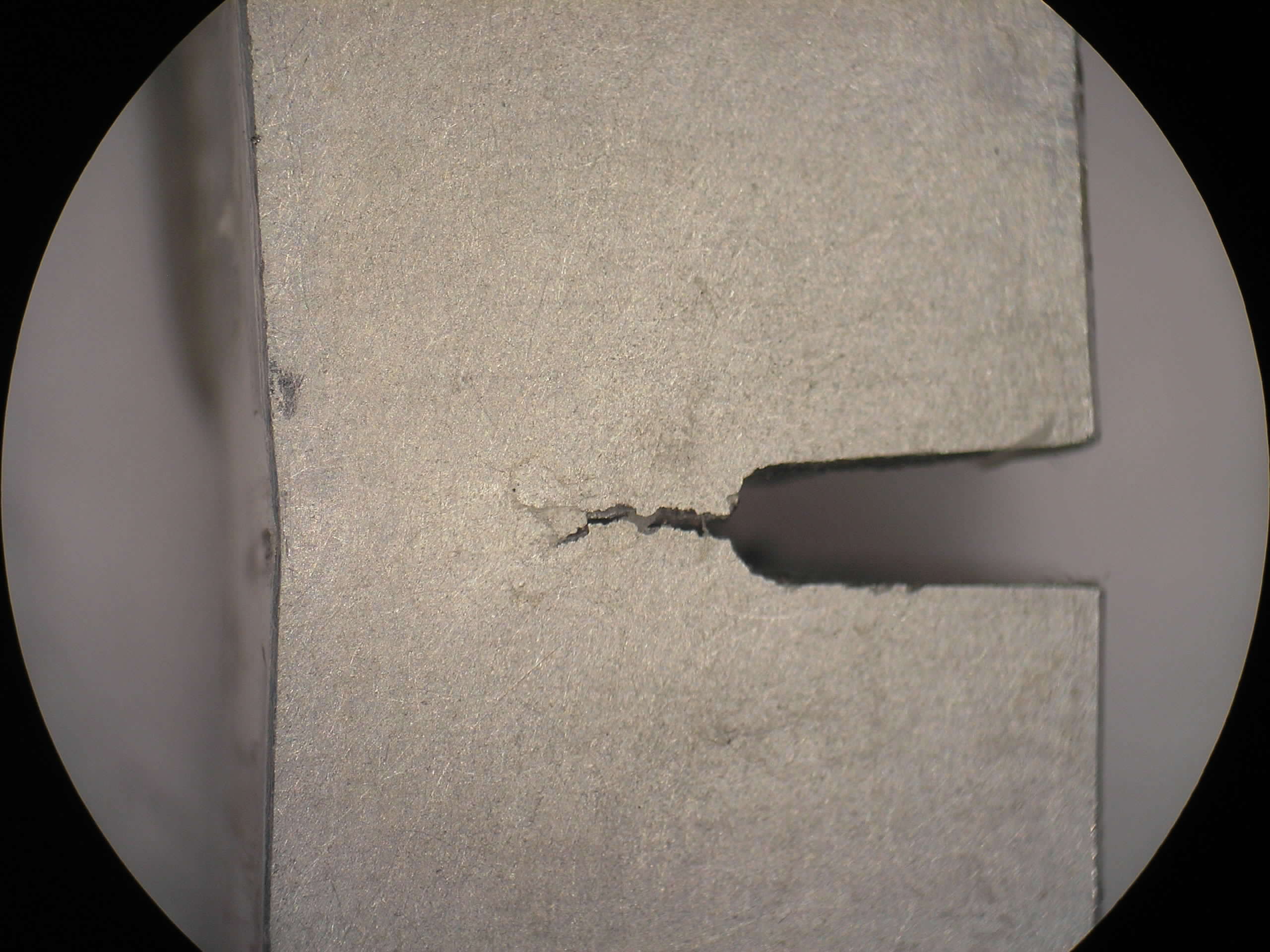ISO 7539-6 Fracture Testing under Stress Corrosion Conditions
The ISO 7539 series is a comprehensive set of standards for fracture testing, which plays a crucial role in the metallurgy and material testing sector. Among these, ISO 7539-6:2018, titled "Metallic materials - Fatigue crack growth under stress corrosion cracking conditions," provides essential guidelines for evaluating the resistance of metallic materials to fatigue-induced cracks that propagate under a combination of mechanical stress and corrosive environments.
This service is particularly vital in industries where materials are exposed to both mechanical loading and environmental factors, such as aerospace, chemical processing, and offshore oil & gas. The test method assesses the crack growth behavior at specific stress levels and exposure times, thus providing insights into material integrity under real-world conditions.
The process involves subjecting specimens to a cyclic load in an aggressive environment (e.g., chloride or hydrogen sulfide environments). This testing helps manufacturers identify materials with improved resistance to stress corrosion cracking (SCC), ensuring that products are reliable and safe for use. By understanding SCC mechanisms, engineers can design parts and components that withstand harsh operational conditions without failure.
Our team of metallurgists and material scientists uses advanced instrumentation such as fatigue testers equipped with environmental chambers capable of simulating various corrosive atmospheres. Specimens undergo controlled loading cycles while immersed in the specified solution. Crack growth rates are monitored continuously, providing detailed data on how materials respond to stress-corrosion environments.
The ISO 7539-6 methodology is critical for several reasons:
- Evaluating fatigue crack growth under SCC conditions
- Identifying susceptible materials and regions prone to cracking
- Comparing different alloys or coatings in terms of their resistance to SCC
- Providing a standardized approach to testing across industries
The service is highly valued by quality managers, compliance officers, R&D engineers, and procurement teams who need assurance that materials used meet stringent performance criteria. Our lab adheres strictly to ISO 7539-6 requirements to ensure accurate and reliable results.
| Test Parameter | Description |
|---|---|
| Stress Intensity Factor Range | The range of stress intensity factors applied during the cyclic loading process, typically covering a wide spectrum from low to high values. |
| Environmental Conditions | Type and concentration of corrosive agent used in the environmental chamber. |
| Load Control | Methodology for controlling load application during fatigue cycles, ensuring precise stress levels are maintained. |
| Cycle Counting | The number of loading-unloading cycles performed to observe crack growth behavior over time. |
By leveraging this service, clients gain a deeper understanding of their materials' performance under challenging conditions. This knowledge is invaluable for improving product design and ensuring compliance with regulatory requirements.
Scope and Methodology
The scope of ISO 7539-6 extends to the evaluation of metallic materials subjected to stress corrosion cracking in cyclic loading environments. The methodology involves a combination of mechanical testing techniques and environmental conditioning, which are detailed below:
- Cyclic Loading: Specimens are subjected to repeated cycles of tensile or compressive loading.
- Environmental Exposure: Samples are exposed to specific corrosive environments that mimic real-world conditions.
- Crack Growth Monitoring: Continuous monitoring of crack growth using advanced imaging techniques and electronic strain gauges.
The procedure begins with selecting appropriate specimens based on the material being tested. These samples are then prepared according to ISO 7539-6 specifications, ensuring uniformity across all test runs. After preparation, they undergo cyclic loading in an environmentally controlled chamber, where corrosion is induced by immersion in a solution containing chloride ions or other relevant compounds.
Throughout the testing process, data on crack initiation and propagation are collected using high-resolution cameras and specialized software packages designed for crack analysis. This allows our team to accurately measure crack growth rates under varying stress levels and environmental conditions.
The results of this testing serve multiple purposes:
- Data Collection: Comprehensive datasets that document the behavior of materials in stress corrosion cracking environments.
- Material Selection: Identification of suitable alloys or coatings for specific applications based on their resistance to SCC.
- R&D Insights: Understanding the mechanisms behind crack initiation and propagation, leading to innovations in material science.
The methodology adheres strictly to ISO 7539-6:2018 standards, ensuring that all tests are conducted under controlled conditions and interpreted consistently across different laboratories.
Eurolab Advantages
At Eurolab, we pride ourselves on offering unparalleled expertise in materials testing. Our team of highly qualified professionals brings extensive experience in fracture mechanics, stress corrosion cracking, and related fields to every project. With state-of-the-art facilities equipped with the latest technologies, our lab ensures that each test is conducted under optimal conditions.
Our commitment to accuracy and reliability extends beyond just adhering to international standards like ISO 7539-6; we also emphasize:
- Precision Instrumentation: Use of high-end fatigue testers, environmental chambers, and crack monitoring systems.
- Comprehensive Reporting: Detailed reports that provide not only numerical data but also visual aids to enhance understanding.
- Custom Solutions: Tailoring test protocols to meet the unique needs of our clients' projects.
- Ongoing Support: Post-test consultations and recommendations for improving material performance based on test results.
We strive to build long-term partnerships with our customers, providing them with consistent quality and innovation in materials testing. Whether you're a company looking to ensure product reliability or an academic institution seeking cutting-edge research tools, Eurolab is your trusted partner for accurate and reliable fracture mechanics and failure analysis.





